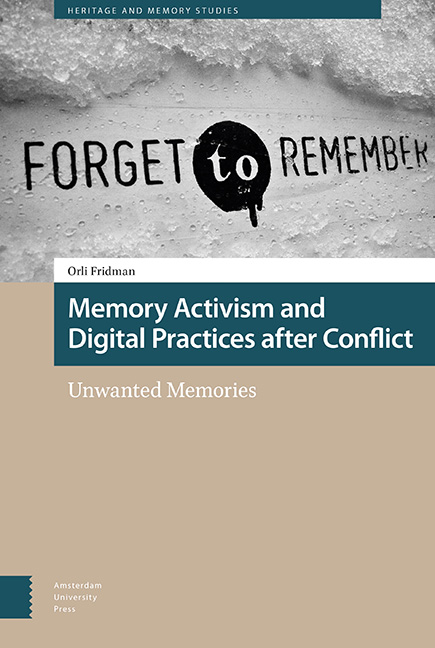Book contents
- Frontmatter
- Table of Contents
- List of Figures
- Preface
- Acknowledgements
- Introduction: Memory Activism and Alternative Commemorative Practices after Conflict
- 1 Unwanted Memories of (the Wars of) the 1990s
- 2 ‘Not in My Name’: From Anti-War to Memory Activism: The First Generation
- 3 ‘Too Young to Remember, Determined Never to Forget’: The Second Generation
- 4 Hashtag Memory Activism: Digital Memory Practices and Online Commemorations
- 5 Regions of Memory: The Post-Yugoslav Space as a Region of Memory Activism
- Epilogue: Unwanted Pasts in an Unresolved Present
- Appendices
- Bibliography
- Index
Introduction: Memory Activism and Alternative Commemorative Practices after Conflict
Published online by Cambridge University Press: 07 October 2022
- Frontmatter
- Table of Contents
- List of Figures
- Preface
- Acknowledgements
- Introduction: Memory Activism and Alternative Commemorative Practices after Conflict
- 1 Unwanted Memories of (the Wars of) the 1990s
- 2 ‘Not in My Name’: From Anti-War to Memory Activism: The First Generation
- 3 ‘Too Young to Remember, Determined Never to Forget’: The Second Generation
- 4 Hashtag Memory Activism: Digital Memory Practices and Online Commemorations
- 5 Regions of Memory: The Post-Yugoslav Space as a Region of Memory Activism
- Epilogue: Unwanted Pasts in an Unresolved Present
- Appendices
- Bibliography
- Index
Summary
Abstract
This chapter introduces the book's inquiries into the mnemonic practices and claims of memory activists as they engage with remembrance and alternative knowledge production of otherwise silenced and unwanted pasts. It presents a framework for the analysis of non-state commemorations as alternative commemorative events, as they become apparent in the aftermath of war and violence. By utilizing Ann Rigney's memory-activism nexus (2018), it examines the ways in which memory activists, as local actors, claim agency and space by establishing alternative commemorative events marked on alternative calendars. Finally, the methodological approach of this study is discussed, and a generational lens is proposed as a means of delving deeper into the shifts in and nuances of the practices of memory activists.
Keywords: alternative commemoration, alternative calendars, memory activism, generational lens, agency, commemorative solidarity
It was on 10 July 2004 that I first joined the Women in Black in their hourlong silent vigil in Republic Square in downtown Belgrade. On that warm summer evening, in the heart of their city, they gathered as they have been doing since 1996, to commemorate the ninth anniversary of mass crimes committed in Srebrenica and to remember the victims as victims of genocide. At the time, I was studying the group's anti-war activism and its legacy, which I thought had turned towards peace activism. Yet, as I was observing the commemorative event that summer, and in the summers that followed, and later in other annual commemorations I was able to join and document throughout the years, it became clear to me: anti-war activists had already begun to profoundly engage with questions that demanded they look backwards, into the very recent past – to memory, counter-memory, and alternative commemorations. In the coming years, I was able to identify the creation of those alternative commemorations as part of what I present here as the foundation of an alternative civic commemorative calendar in Serbia, which has established an annual cycle of remembrance related to memory of the wars that followed the break-up of Yugoslavia. This work is central to the inquiry of this book: the work and mnemonic practices and claims of memory activists as they engage with remembrance and alternative knowledge production of otherwise silenced and unwanted pasts. In other words, the work of memory activists traced in this book is the work of those who labour with memory (Jelin 2003).
- Type
- Chapter
- Information
- Memory Activism and Digital Practices after ConflictUnwanted Memories, pp. 15 - 36Publisher: Amsterdam University PressPrint publication year: 2022

